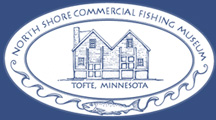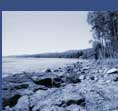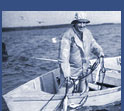 |
    |
|||
About UsMore articles from the North Shore Commercial Fishing Museum Journal
|
North shore commercial fishing museum journalHelmer Aakvik's daring rescue attemptStory Told by Helmer Aakvik On November 28, 1958, Helmer Aakvik, a 63 year old Norwegian born fisherman set out in his wooden skiff to rescue his young partner from one of Lake Superior's Fiercest storms. Although he never found his partner this heroic adventure earned him the Carnegie Award for Heroism! Yah, I was caught out there one time, 28 hours. There was this young kid, just got out of the Navy, worked on destroyers. Well, he heard Dickie Eckel made ten thousand dollars fishing the year before and figured, "If Eckel can do it, so can I". You know how young kids are, destroyers and all. He had no respect for the lake-- no respect. And you know they say, "Superior, she don't give up her dead". I don't remember now if Nels sounded the alarm or if it was Don Palmer. It was about seven in the morning and the kid had gone out. It was cold, the lake was smoking. You could tell there was a nor'wester gonna blow up- but the kids, he didn't know no better. Well, I knew where he had set, about a mile west of here. He was fishing out of the same fish house. That was another thing; I went down to the fish house and seen the kid had taken my gas- not that he wasn't welcome to it- but he was using a new Johnson motor that took one quart of oil in five gallons, and I was using old Lockports and Johnsons that took two in five gallons. That coulda gummed up he motor. And there was water in the gas and he hadn't filtered it. Well, anyway I got ready to go out and look for him. I put on lots of wool, pants and shirt. It was six below then. I had a rubber suit over that, and wool mittens and a sheepskin helmet. I got an old fish box, a rope for a sea anchor and set out I guess about eight o'clock. The wind had come up and the sea had really started to run. I went out to where Gillis had his nets and there was nobody around. I figured he had trouble with his motor and must have drifted. If he'd have tied up to his nets he'd still be alive. Those anchors weigh three, four hundred pounds. They'll hold you in anything. So, anyway, when he wasn't there, I shut off my motor and drifted- figured I'd go the same direction as he did. The sea was building bigger and bigger the gurther out I got with that offshore wind- seventy miles an hour they said. I got maybe ten miles in the shipping lanes, and a big ore boat went by. The seas were running so big I couldn't even glimpse the high land at Hovland. The ore boat wasn't going nowhere, just holding her own, and I was in a skiff- only eighteen footer, so I decided maybe I should head back. There was no sign of him out there. I'd been getting a lot of spray and everthing off the top of them seas, all over the motor. There was no jacket on it, it was all ice. The gas line froze up, so I couldn't get it going. Well, I had no tools-- just an ax-- so I had to bare my hands to get the gas line off. Then I stuck it in my mouth and got the ice out you see. Well I got the motor going, and pretty soon a big sea went right over me, and the skiff was swamped- oh, I'd guess a quarter full. I had the Lockport on the front of the boat, but it was too much weight so I threw it overboard. I was still warm, you know with the rubber boots and all, and the wool that keeps you warm even when it's wet. So I kept heading into that. All I could do was to keep into the wind. I wasn't going nowhere the sea was so big-- maybe twenty, 25 feet. The skiff was taking a terrible pounding. It was an old skiff anyways and it started to come apart and leak real bad. It was full to the top with water and the planks were separating, the screws pulling right out. Well, I couldn't keep going like that, or soon I'd have no skiff left, so I shut the motor off and drifted- drifted the rest of the day, all night and the next forenoon. The worst enemy when you're cold and hungry is sleep. You can't sleep. If you do, you're gone. I had that hatchet along. I chopped ice all night. If that ice builds up too much you get top heavy and just roll over in the troughs. I think that's what happened to that young fella. He didn't have nothing to chop ice with and probably just went over. It was probably quick, I don't think he suffered much. Probably just went to sleep. One time during the night I even saw the Coast Guard cutter. They stayed just outside Chicago Bay. It was too rough for them to go out any further and they were afraid of the floating ice. They were shining their lights out on the lake-- big searchlights-- and even up in the country. I don't know if they expected to find me up there. A jet flew over so low it almost took off my helmet. The came out of Duluth and tried to get a radar fix on me, but that wouldn't do no good in that sea. Well, the next morning the wind had calmed some. It was still rough out there, but time to think about getting back in. I couldn't glimpse the shore, even from the top of the seas, but sun shone up and I knew which way to go. I had to get the motor started you see, but the rope was all ice and wouldn't fit in the groove. The whole front of the skiff where I couldn't reach the ax was ice-- a foot, maybe two, thick. I had to chop my mitts off with ax. I needed bare hands to unravel the starting rope, to get one strand out that would fit in that motor. Well, I got the motor going and headed back towards shore. It was real slow with skiff swamped and all that ice. I couldn't chop no ice up in front. I got my legs froze in solid so I couldn't stand even. I run like that about six hours. Then out about a mile out from John Koss' the motor quit. No gas... Well, I sat thinking about what to do. I still had my oars-- I didn't throw them over. But my hands were too cold to grip them. I had a knife and a heavy wool shirt on and I figured I could just cut some mitts from out of the back you know, then I could row. Well, I looked up and there was the cutter. They run right into the side of the skiff! When we got back to the town dock there must have been a hundred people there. They even had a doctor there. And a helicopter-- supposed to take me to the hospital. As if I needed a hospital! I only froze two toes where I cut the rubber boots with the ax chopping ice, and water got in. I said before I went out, "Don't you worry, the old man will be back." And Elmer Jackson, he comes up to me and says, "You are a man of our word, you came back." Not, I couldn't do that no more, I was only sixty then. Volume 3 fall 1995 issue 4 |
|||
 |
||||
|
Plan Your Visit | Events & Programs | Exhibits | Collections | Museum Store | Membership | About Us | Home © copyright 2003, North Shore Commercial Fishing Museum. http://www.commercialfishingmuseum.org web design by homepage design |
||||